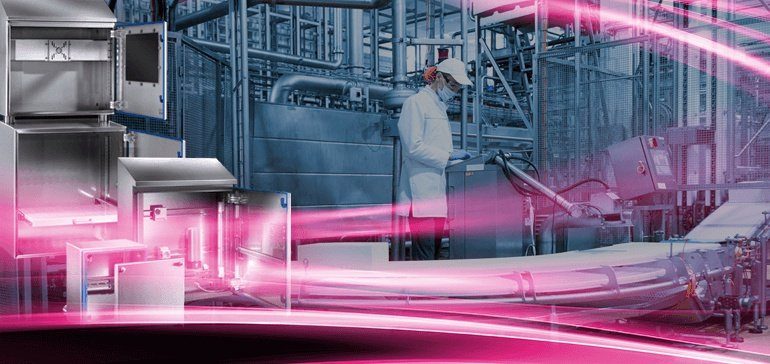Hybrid technology enables food production facilities to leverage energy-efficient automation

Sustainability is top of mind for both consumers and food producers, which means production facilities are proactively looking for ways to decrease the carbon footprint of their operations. In addition to alignment with consumer sentiment — and their own corporate values — this effort can afford major benefits to manufacturers, including a substantially lower energy bill. One way for plant operators to significantly reduce energy usage is to consider the performance of their industrial cooling units.
Industrial automation increases efficiency — and energy usage
As food plants incorporate more sophisticated automation, their energy usage often increases. Every robot or conveyor belt requires power, and every power distribution panel must be enclosed and cooled in order to prevent overheating and costly downtime.
Additionally, the advancements of Industry 4.0 and the Industrial Internet of Things (IIoT) mean that manufacturing now produces a lot of data. This data gives operators greater insights into their production processes and allows teams to collaborate effectively, but it also needs to be processed and stored, ideally as close to the location where it is generated and used as possible. As industrial facilities invest in edge data centers, they are increasingly specializing not only in industrial automation but in IT networking, which means servers, which means — you guessed it — another thing to cool.
New cooling technologies support automation while lowering a facility’s carbon footprint — and energy costs
Energy-efficient industrial and IT climate control solutions like Rittal’s Blue e+ cooling units are helping organizations reduce energy consumption and energy costs. The Blue e+ line features cooling capacities up to 6,000 watts and can be used in environments ranging from -4°F to 140°F. Even better, its powerful cooling capabilities deliver up to 75% energy savings.
The Blue e+ represents a quantum leap in terms of energy conservation due to its patented heat pipe technology. This innovative hybrid process relies upon two parallel cooling circuits working together, depending on temperature difference.
The integral heat pipe dissipates heat from the enclosure as soon as the ambient temperature falls below the setpoint, providing passive climatization. Active climatization is achieved via the compressor’s cooling circuit with speed-controlled components for demand-based cooling. This unique inverter technology provides cooling output that is always exactly the amount needed at the time.
Not only is energy consumption far lower than with conventional technology, but the improved cooling leads to longer service life of the components inside the enclosure and the cooling unit itself.
Keep new UL certifications in mind when upgrading old cooling units
With UL Standard 1995 and CSA Standard C22.2 No. 236, two standard requirements that apply to heating and cooling equipment, currently scheduled to sunset on November 16, 2022 and November 30, 2022, respectively, ushering in the next generation of climate control safety standards.
The new standard UL/CSA 60335-2-40 is an ANSI/SCC-approved refrigerant detector standard that covers electrical heat pumps, air conditioners, and dehumidifiers. Among other things, it requires smart leak detection systems for climate control systems that use flammable refrigerants.
Although UL/CSA 60335-2-40 won’t be mandated until after January 1, 2024, many food and beverage manufacturing facilities that rely on industrial automation are transitioning to certified climate control solutions now to ensure they are ready — and many are turning to cooling technologies that don’t use flammable refrigerants at all, such as Rittal’s Blue e+ chillers and cooling units.
The benefit to transitioning to climate control solutions that are UL Certified to UL/CSA 60335-2-40, such as Rittal’s Blue e+ line, now is that you can reduce your energy usage, decrease the time you spend on maintenance, and lower your energy costs.
Learn more about Rittal’s line of energy-efficient industrial climate control solutions at info.rittal.us/climate-solutions-handbook.
Source: fooddive.com

